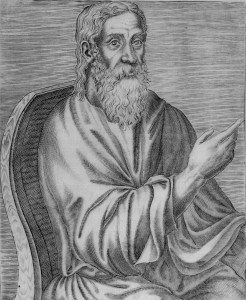
Theology
What Do You Believe?
“How, let me ask, have you believed vain fables, and supposed animals to be charmed by music; while Truth’s shining face alone, as would seem, appears to you disguised, and is looked on with incredulous eyes?” — Clement of Alexandria¹
Everyone reading this post has some belief about God. The religious and atheist alike believe in the certainty of their conviction. The agnostic believes that one either does not or cannot know that God exists; but even believing in uncertainty is still a belief.
 The early church father, Clement of Alexandria, posed the question quoted above to the people of his day. It was a very apt and appropriate question from the Athens born Christian teacher and philosopher. Clement of Alexandria was a noted leader of the Church in the late 2nd and early 3rd century (born ~150 A.D., died ~215 A.D.). Alexandria Egypt in Clement’s day was a city of more than a million people and represented the apex of worldly and scientific knowledge. Clement thrived in this environment as he developed and championed reason and meaning for Christ and the Christian faith using the language of Greek philosophy. The theologian reconciled faith with the best of worldly and scientific knowledge in his time.
The early church father, Clement of Alexandria, posed the question quoted above to the people of his day. It was a very apt and appropriate question from the Athens born Christian teacher and philosopher. Clement of Alexandria was a noted leader of the Church in the late 2nd and early 3rd century (born ~150 A.D., died ~215 A.D.). Alexandria Egypt in Clement’s day was a city of more than a million people and represented the apex of worldly and scientific knowledge. Clement thrived in this environment as he developed and championed reason and meaning for Christ and the Christian faith using the language of Greek philosophy. The theologian reconciled faith with the best of worldly and scientific knowledge in his time.
Eighteen centuries later people of our day would do well to step back and consider the question posed by Clement of Alexandria. The philosophy of our day is no more than a repackaged mixture of concepts that were in play in Alexandria in 200 A.D. Great strides have been made in science and technology. However, worldly concepts have remained fundamentally unchanged from the perspective of, and in contrast to, the constancy and truth of the Gospel. The fundamental truths of God have not changed in the four thousand years since Moses recorded the first five books of scripture. In the early years of the Church Clement unearthed eternal truth and he also recognized that transient worldly knowledge contained elementary yet fragmentary components of truth which could be useful in communicating the real truth of God to mankind. Clement observed that spiritual truth came by the incarnate Word of God (Jesus) and the Holy Spirit. But he also realized that the Christian could utilize worldly knowledge in communicating eternal truth to people of the world.

Clement of Alexandria was not a relativist or moderate who compromised the truth of God to further his positions or increase his standing with others. He faced persecution in his day beyond that faced by Christians today, at least for Americans in the 21st century. Clement’s significance for the Church was founded on his great ability to stand true to God’s truth in the language and thought of the day. As a theologian and leader Clement fought battles both within and outside the church with steadfast reliance on eternal truth. Clement proclaimed truth yet also employed measured deference to flawed philosophies underpinning opposing positions. In this manner he sought to “pull” others along. This approach allowed provoking engagement rather than dismissive dispatching of opponents or their flawed reasoning and positions.
Clement in this sense adopted the approach of the Apostle Paul, who writes in his first letter to the church in Corinth:
“For though I am free from all men, I have made myself a slave to all, so that I may win more. To the Jews I became as a Jew, so that I might win Jews; to those who are under the Law, as under the Law though not being myself under the Law, so that I might win those who are under the Law; to those who are without law, as without law, though not being without the law of God but under the law of Christ, so that I might win those who are without law. To the weak I became weak, that I might win the weak; I have become all things to all men, so that I may by all means save some.” (1 Corinthians 9:19–22, NASB95)
It is certainly true that in many aspects the 21st century is a very different world than that of the 3rd century.
- We live in the information age.
 This is a wholly different paradigm for 21st century Christians compared to early Christians. Over 2 billion people today have smartphones. Access to information has exploded in recent decades.
This is a wholly different paradigm for 21st century Christians compared to early Christians. Over 2 billion people today have smartphones. Access to information has exploded in recent decades. - The meanings of words and concepts have changed over the millennia, and societal influences over even spiritual terms are evident and increasing. This dynamic sways how people fundamentally view themselves, approach God, their view of faith, and their relationship with God. Our culture’s attempts to redefine God’s concept of “marriage” is but one recent example. But many words, even as basic as one such as “scripture,” can differ in concept today contrasted to the time it was first penned. While early Christians considered a canon of “modern” scriptures as well a list of Old Testament books known as Melito’s canon as early as 170 A.D. there was absent sharp delineation of included and excluded works as exists today. The Latin Church Fathers provided the first “official” list of books of the bible at the end of the 4th century in the Synod of 397 (the Council of Carthage). Early Christians prior to this time generally applied a gradation of spiritual quality among a variety of books and writings that their particular group accepted.
Churches of the 21st century may be differentiated from early churches of the 3rd century in innumerable ways but one factor remains absolutely constant. God is unchanging. No change in man’s understanding changes God. God is. This is true regardless of man’s thinking. No changes which man can make in himself or his knowledge, science, bible, dictionary, culture or society can in any manner alter God’s plan for man nor his ability to engage in relationship with his eternal Creator. Mankind cannot change God’s plan which existed before man first arrived on earth. A man or woman may choose whether or not to accept God’s plan for man, but he or she cannot amend, append, modify or supersede that plan.
Clement’s question was appropriate to every mortal man and woman who walked the earth in his day. It is no less important to each and every person who has been blessed with life every day since — including today. What do you believe?
“The way to Jesus is not by Cambridge and Oxford, Glasgow, Edinburgh, London, Princeton, Harvard, Yale, Socrates, Plato, Shakespeare or the poets — It is over an old-fashioned hill called Calvary.” – Gipsy Smith


Discussion